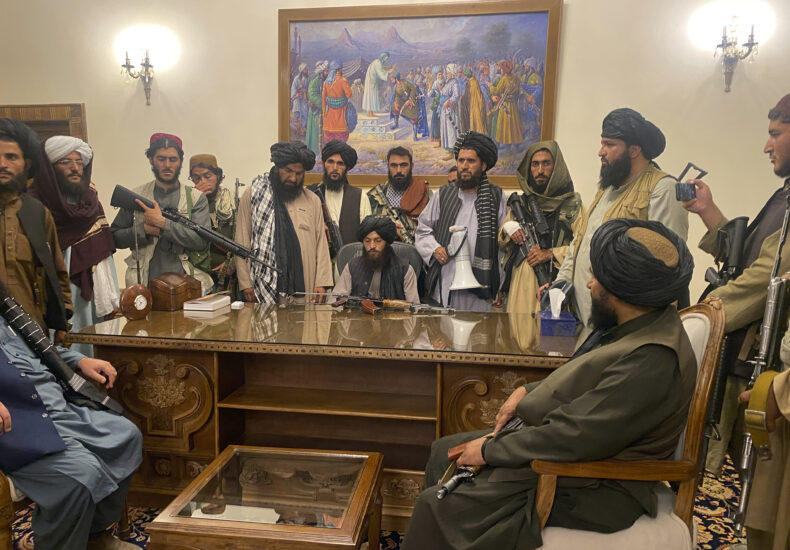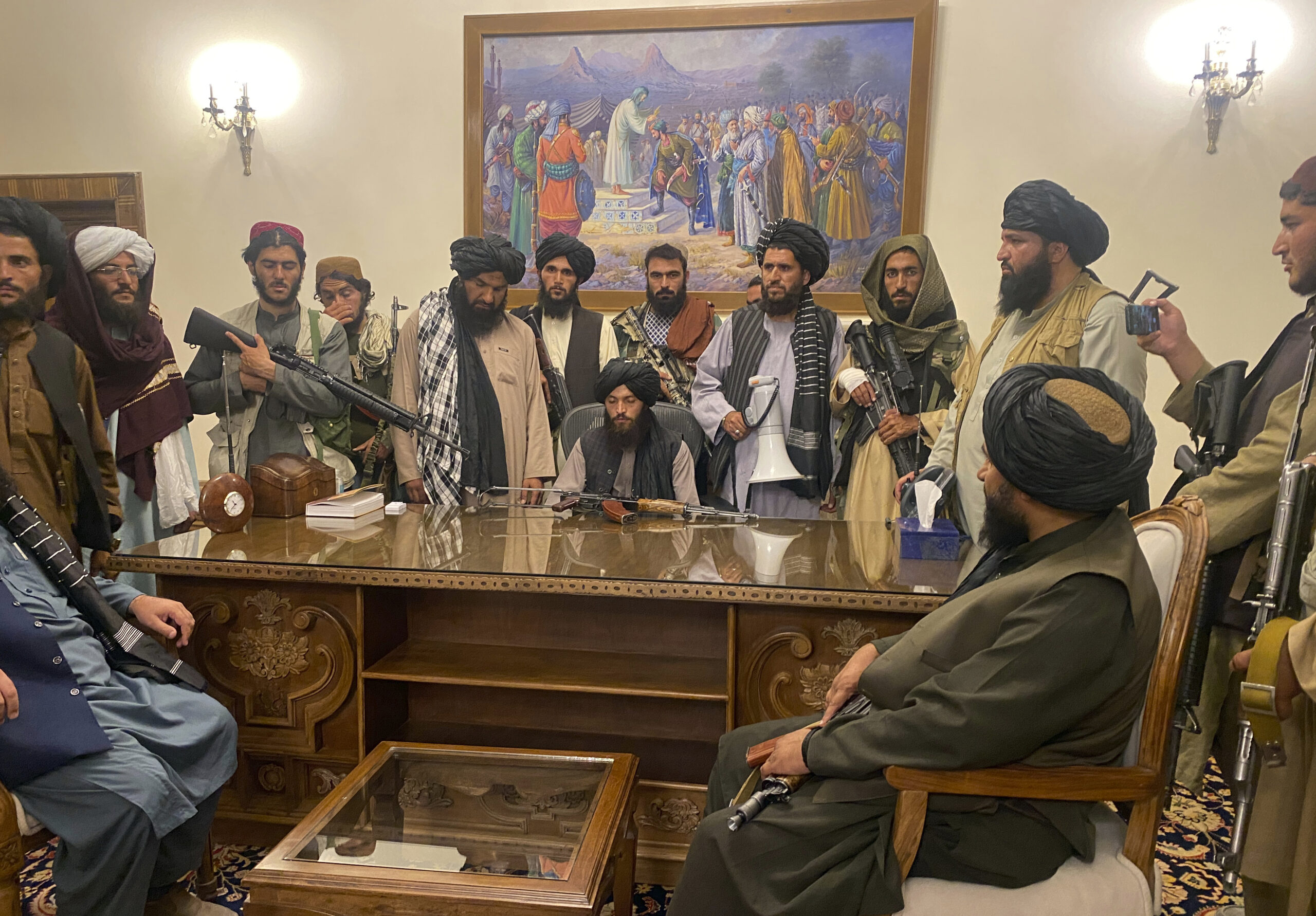BY: Tony Johnson

PEJOURNAL – When the Taliban aspired to rule Afghanistan for the past 20 years, it was known as a terrorist group that collaborated with al-Qaeda. But today, due to US foreign policy confusion, there is a terrible government in Afghanistan. A regime that emerged with the flight of the United States and NATO from this country. What remains today in Afghanistan after 20 years of US and NATO military presence, as acknowledged by US and European military commanders and politicians, is in one sentence that our entry into Afghanistan was a tragedy, our presence is a tragedy, and our departure is a crime.
When the United States entered Afghanistan 20 years ago, its people had no government, no army, and no national sovereignty. Exactly twenty years after the US and NATO withdrew from Afghanistan, Afghanistan has no government, no army, no constitution and no national sovereignty. 20 years that turned the golden dreams of the Afghan people into a horrible nightmare in the end and left a legacy of betrayals, crimes and destructions that will never be forgotten as part of the history of Afghanistan and the folly of the United States.
In any case, this terrible tragedy in Afghanistan is the result of 20 years of European and American presence in this country, which after twenty years of effort and expense could not establish a government in this country that would make the world safer than before.
Now, with the hasty withdrawal of the United States from Afghanistan, one of the country’s most important bases in the region has been lost. Of course, the United States believes that US rivals, including China, Russia, and Iran, will benefit in the short term, but in the long run, Washington expects the Sunni Taliban to gain power in the crisis-stricken region. Continuing Muslim Brotherhood, Salafism and Wahhabism in Afghanistan, Pakistan, UAE, Saudi Arabia and Turkey.
It caused serious disturbances for China in the Uighur region, for Russia in Chechnya, and for Iran along the Sunni border. Especially after the establishment of the Taliban in Afghanistan, the crescent of Salafism and Wahhabism can control the Shiite crescent of Iran, which passes through Iraq and Syria and ends in Lebanon and Yemen, militarily and ideologically, and be an influential barrier for ayatollahs in Iran, which is still thinking of exporting and spreading Shiite thought in Asia and Africa.
In fact, another fundamental point to note is that the Taliban’s Sunni religious leaders do not fundamentally disagree with the Shiites in principle, and naturally, the anti-Shiite Taliban approach that the United States expects will not bring about the desired fundamental changes. Today, the Taliban need the Ayatollah regime in Iran much more than Iran needs the Taliban.
So today’s Taliban for Iran cannot be yesterday’s Taliban. But certainly the traces of the destruction of the Taliban, which collaborates with al-Qaeda and even branches of ISIS, for Europe and the United States will be based on the Taliban yesterday, who have displayed terror on the streets of Europe and the United States over the past few years.
Thus, given the fact that the Taliban can never have good political and security relations with Europe and the United States, so does their dependence on countries in the region such as China and Russia, and especially on Iran, which borders the Taliban 900 km, with lots of cultural and racial issues in common with Afghanistan, can directly supply the Taliban with needed energy and essential goods.
On the other hand, China’s effective support for the Taliban will sound another alarm against the United States and its European rivals. Beijing’s cooperation with the Taliban could, in the first instance, divert the capacity of extremist groups in the region against Western interests while preventing border insecurity between the two countries in the Uyghur and East Turkestan regions.
The result of such cooperation between Tehran, Beijing and Moscow with the Taliban could in the future lead to more hostility between the Taliban and al-Qaeda against Western countries and cause the most damage to Europe because it borders extremist Islam and a large number of ISIS elements are from European countries. Al-Qaeda has also been deployed in European countries for years, which is able to carry out terrorist operations on the streets of European countries at the right time.
It is understandable to the United States and Europe that the Taliban today, if true, would not make a difference in the nature of their behavior and actions, even if they were not 20 years ago. But this Taliban for Europe is a major difference from the Taliban for the United States. The medieval pressures of the Palestinians drove millions of Afghan refugees, not a single one of whom reached the United States, but all of whom were destined for European countries, led by Germany.
Undoubtedly, Russia, in cooperation with Belarus in retaliation for Western sanctions, will facilitate the passage of migrants so that they can reach Poland and then Germany and Europe more easily than before. So it remains a global target for the United States, the Taliban and al-Qaeda, and a global problem for Europe.
The question now for US allies in the Middle East and even Europe is how Iran and Russia were able to prevent the fall of the dictatorial Assad in Syria by spending small sums in Syria. The ayatollahs of Tehran not only participated in the defeat of ISIS in Syria and Iraq but also now have better relations with the Taliban than Western countries. While Europe has been reluctant to allow refugees in, Iran has easily controlled Afghan newcomers and been able to provide security along its borders with Afghanistan.
Surely such a situation would certainly not be favorable to the United States and Europe because the geopolitical situation of Iran and Russia could distribute Afghan migrants to European borders and regional insecurity across Europe without spending exorbitant costs.
In this regard, it should be said that another threatening issue for Europe is the acute conditions of the spread of Covid-19 disease throughout Iran, which will worsen the situation with the influx of asylum seekers into the borders of this country and their possible presence in those places. The world will experience another humanitarian catastrophe as the corona-infected migrants on their way to Europe catch cold, rain and snow. Such an issue would add to other problems in the fight against the epidemic and the devastating wave of the disease and the plight of immigrants.
It is estimated that about 1 million Afghans, including legal and illegal immigrants, are moving to Europe in various cities in Iran. Accepting this number of asylum seekers and members of terrorist groups, even temporarily, is a major challenge for Europe. This is all the more complicated by knowing that many new asylum seekers probably have relatives in Europe and can hide with them until they find a legal presence in European countries or terrorist acts. Another threat that could come from Afghanistan is the issue of the presence of ISIS and al-Qaeda members in the guise of immigrants and asylum seekers who will invade Europe and then the United States from the region.
Regardless of the danger posed by the Taliban and Afghan refugees to Western countries, even assuming the Taliban become a moderate group, it is not possible for various Taliban groups to have complete control over all of Afghanistan or their supporters in the region. These conditions could easily lead to the formation of branches of al-Qaeda, ISIS or the Taliban in some countries in the region, or even worse, make Afghanistan the main and official base of terrorist groups again. Because of the weakening of ISIS in Syria and Iraq, there is a possibility that ISIS terrorists will be forcibly relocated to Afghanistan and make it the center of their brutal activities.
ISIS and al-Qaeda have recently settled in Afghanistan in the blink of an eye. Recently, Mullah Baradar, the most important figure and equal to Taliban leader Mullah Hebatullah, Amin al-Haq, a close associate of bin Laden, entered Afghanistan after two decades of secret life. Even Osama bin Laden’s special envoy entered Jalalabad openly with his troops through Pakistan. He is an important member of al-Qaeda’s military wing and a strategic ally of the Haqqani network.
Although these individuals or groups differ from each other over territory, type of governance, and exploitation of interests, have a common goal called “God’s war on the polytheists.” In their view, Western countries, led by the United States, are the enemies of God.
